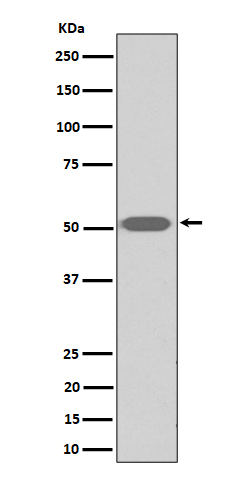
| WB | 咨询技术 | Human,Mouse,Rat |
| IF | 咨询技术 | Human,Mouse,Rat |
| IHC | 咨询技术 | Human,Mouse,Rat |
| ICC | 技术咨询 | Human,Mouse,Rat |
| FCM | 咨询技术 | Human,Mouse,Rat |
| Elisa | 咨询技术 | Human,Mouse,Rat |
| Aliases | BDPLT13; Tbxa2r; TP receptor; TXA2R;;TBXA2R |
| WB Predicted band size | Calculated MW: 37 kDa ; Observed MW: 50 kDa |
| Host/Isotype | Rabbit IgG |
| Antibody Type | Primary antibody |
| Storage | Store at 4°C short term. Aliquot and store at -20°C long term. Avoid freeze/thaw cycles. |
| Species Reactivity | Human,Mouse,Rat |
| Immunogen | A synthesized peptide derived from human TBXA2R |
| Formulation | Purified antibody in PBS with 0.05% sodium azide,0.05% BSA and 50% glycerol. |
+ +
以下是关于Thromboxane A2受体(TP受体)抗体的3篇参考文献概览:
1. **文献名称**:**"Characterization of a monoclonal antibody against the thromboxane A2 receptor"**
**作者**:Hirata, M. 等
**摘要**:该研究开发了一种针对TP受体的单克隆抗体,证实其能够特异性阻断血小板中TP受体的激活,抑制血栓素A2介导的血小板聚集和血管收缩,为研究受体功能提供了工具。
2. **文献名称**:**"Autoantibodies to thromboxane A2 receptor in patients with autoimmune diseases"**
**作者**:Kobayashi, T. 等
**摘要**:研究发现系统性红斑狼疮(SLE)等自身免疫疾病患者体内存在抗TP受体的自身抗体,这些抗体可能通过异常激活受体,加剧血管炎症和血栓形成,提示其病理意义。
3. **文献名称**:**"Targeting thromboxane A2 receptors with specific antibodies attenuates pulmonary hypertension in experimental models"**
**作者**:Smyth, E.M. 等
**摘要**:研究利用TP受体特异性抗体在肺动脉高压动物模型中阻断受体信号,显著减轻肺血管重塑和右心肥厚,为治疗该疾病提供了潜在策略。
(注:以上内容为示例性概括,具体文献需通过学术数据库检索确认。)
The thromboxane A2 receptor (TP), a G protein-coupled receptor (GPCR), plays a critical role in cardiovascular and inflammatory processes by mediating thromboxane A2 (TXA2)-induced platelet aggregation, vasoconstriction, and smooth muscle proliferation. TXA2. a cyclooxygenase-derived eicosanoid, exerts its effects through TP receptor signaling, primarily via Gq-mediated phospholipase C (PLC)-IP3 and G12/13-Rho-ROCK pathways. Dysregulated TP signaling is implicated in thrombosis, atherosclerosis, hypertension, and cancer metastasis, making it a therapeutic target.
TP receptor antibodies are tools to study receptor localization, expression, and signaling mechanisms. Polyclonal and monoclonal antibodies against human or rodent TP isoforms (α and β) help characterize tissue-specific distribution and pathophysiological roles. In recent years, TP antagonist antibodies have been explored for therapeutic potential. For instance, antibodies blocking TXA2-TP interactions may attenuate platelet activation without increasing bleeding risk compared to traditional antiplatelet drugs. Preclinical studies in atherosclerosis and thrombosis models show promising results.
However, challenges remain, including receptor dimerization, cross-talk with other prostanoid receptors, and isoform-specific effects. TP antibodies also aid in identifying biomarkers in diseases like myocardial infarction or TP-related drug resistance. Current research focuses on developing humanized monoclonal antibodies with high specificity and minimal off-target effects, as well as elucidating structural determinants of TP activation through antibody-receptor complex studies.
×